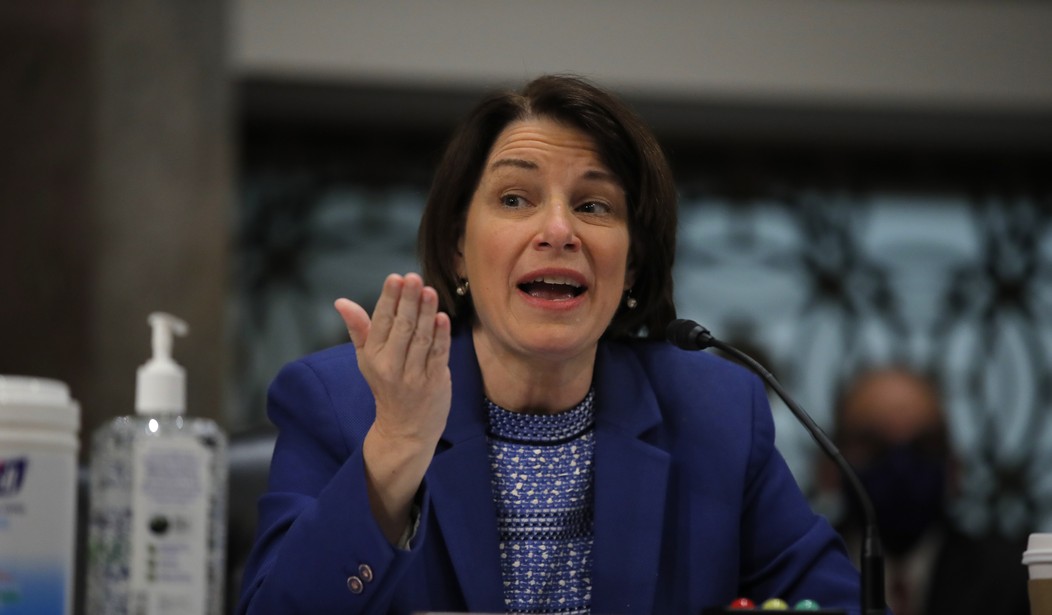A ‘Box Canyon’ is a canyon with one entrance and exit and surrounded on three sides by walls.
As Congress heads towards its summer recess next month, Senator Amy Klobuchar finds herself in a box canyon. The Senator is pushing antitrust legislation that can’t move forward because her options are blocked on all sides by ideological walls. Her only option is to walk back out the entrance and start over from scratch.
For the past nine months, she has been flogging her legislation, the American Innovation and Choice Online Act (S. 2992), that would target a handful of the country’s top tech platforms with draconian regulation aimed at stopping discrimination that allegedly harms the users of these platforms. Since the bill’s contentious markup in the Senate Judiciary Committee back in January, Klobuchar has been haranguing Majority Leader Chuck Schumer to bring the bill to the Senate floor for a vote. While Schumer has been focused on other more pressing issues for Democrats, like jawboning about guns and abortion, Klobuchar has been telling everyone within earshot that she has enough Republican votes to get her bill passed in the Senate.
In reality, her bill is on life support.
The problem is that while concerns with Big Tech may be bipartisan in Congress, the primary issue motivating Republican angst is one that Democrats outrightly reject. When it comes to their beef, Republicans’ core concern is that these companies engage in content moderation practices that reflect a consistent bias against conservatives. The issue isn’t that Big Tech inhibits all efforts by conservatives to use their various platforms. They clearly don’t, which is evident by the success with which conservatives have used these platforms to communicate. Rather, the issue is that when these platforms do elect to put their thumb on the scale in throttling information, it appears always to cut against conservatives. That is, when it comes to content moderation policies, Republicans believe that the platforms discriminate in the application of their terms of service in ways that permit information (or even disinformation) that progressives support while stifling conservative speech.
Recommended
Democrats consider these complaints about conservative bias to be hogwash. Indeed, the ability of platforms to curb the spread of “misinformation” is perhaps the one thing that progressives are willing to allow Big Tech to do. And it is Democrats’ desire to ensure that these platforms have no limitations on how they moderate content that has created Senator Klobuchar’s current dilemma.
Klobuchar’s bill, according to several progressive legal experts, would open the door to some enterprising red-state attorney general using the new law to sue one of the regulated platforms if their content moderation decisions discriminated against conservatives. As a fix, four of her Democrat Senate colleagues wrote a letter to Klobuchar proposing that she add language to the bill that would prevent it from being construed to impose liability for moderating content on the platform, such as removing “hate speech” and fighting “misinformation” online. If the bill is not modified, these four Senators claim that the legislation would “supercharge harmful content” online.
Senator Klobuchar has claimed that these concerns are overblown and that her bill could not be used for such purposes. Rep. David Cicilline, the lead Democrat cosponsor of a similar House bill, was also dispatched to write a letter responding to the Democrat Senators in an attempt to refute their claims that the bill would facilitate challenges to discriminatory content moderation practices by the targeted tech companies. All of this begs the question, however, why Democrat sponsors of the legislation are so adamantly against adopting the suggested language.
Senator Klobuchar’s predicament is that addressing this concern will effectively tank her bill by causing her to lose whatever Republican support she claims to have for the legislation. Senator Chuck Grassley, the main Republican cosponsor of the bill, has already said as much, stating publicly that adopting such language would be a non-starter for Republicans. Adding a carveout that effectively codifies the Democrats’ derision of Republican complaints about conservative bias by the tech companies is clearly a bridge too far even for supporters of the bill like Senator Josh Hawley.
And so, with just three work weeks available before the August recess, Senator Klobuchar finds herself in a bind. In order to convince Senator Schumer that her bill has the votes to proceed to the Senate floor, she needs to maintain whatever Republican support she claims to have for the legislation. But doing so means losing the votes of Democratic Senators who harbor concerns that the bill will undermine efforts to moderate content in ways favored by progressives.
Congress’s allegedly bipartisan push for tech regulation has always relied on both sides ignoring the fact that Democrats adamantly dismiss Republican’s primary concern that Big Tech is biased against conservatives. It seems fitting that Senator Klobuchar’s legislative effort should fail once it was marched into an ideological Box Canyon with no escape.
Andrew Quinlan is the president of the Center for Freedom & Prosperity (@CFandP)

























Join the conversation as a VIP Member